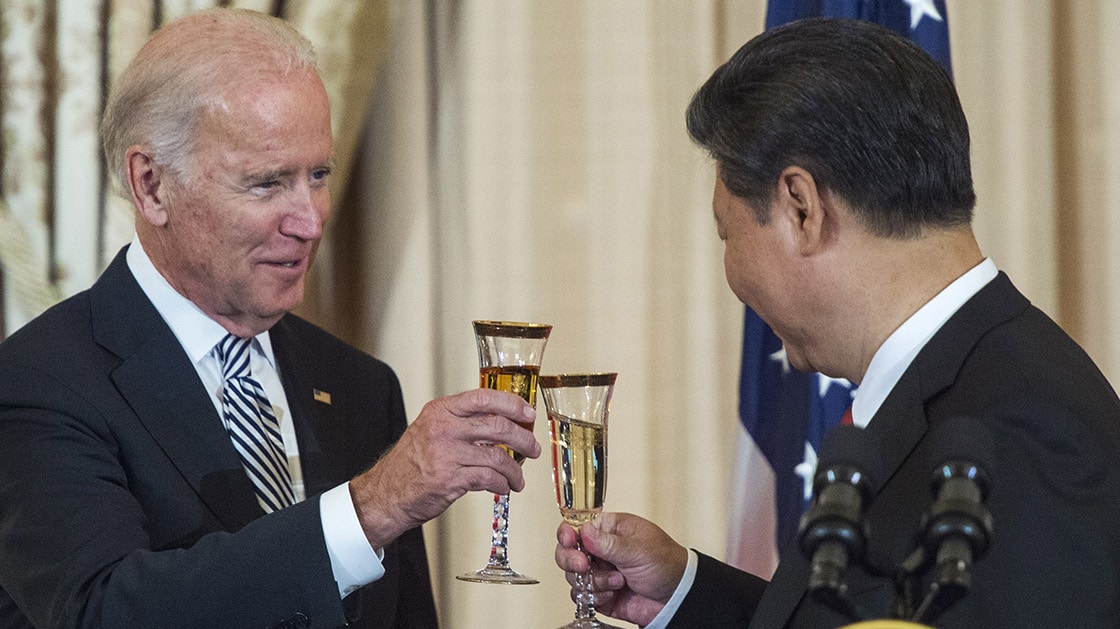TOM PLATE WRITES — A re-released photo of Joe Biden, then U.S. vice-president, on the North-South Korean border, is being touted by some as evidence of embedded American imperial complacency. Yet it’s almost a required photo stop for American politicians who, as if some mountain-climbing Edmund Hilary, can never be happy except at the top. This career politician is pictured peering northwesterly, like General George Patton through all-seeing binoculars at the potential battlefield arrayed before him.
It’s certainly true that Joseph Biden has had enough foreign policy experience for two candidates for the US. presidency. And as VP, his views were not always a perfect reflection of those of his boss for eight years, President Barack Obama. What he would do for Asia if he is sworn in next January as the 46th president is no mystery: he would play nicer with allies without kowtowing to others. On that official visit to South Korea in 2013, he showed characteristic empathy: He rightly decried Washington’s practice of threatening U.S. troop withdrawals whenever South Korean hints of deviation from U.S. policy; this is not, he implied, the way allies should relate. He is right: The way Washington over the decades has treated its key allies has been less than exemplary.
The U.S. commitment to South Korea is quite two-faced: More likely Donald Trump would start wearing medical masks than U.S troops would ever actually be withdrawn, baring a peace breakthrough with China. It should be obvious that we are gracing South Korea with our constant military presence not solely for the Koreans, but to afford a flexible military option against the Chinese and, for that matter the Russians. The U.S. military almost always plays to stay.
In fact, China, perhaps more than Russia, spooks the American political, military and security-intelligence establishment, including many otherwise temperate Bidens. The last 3.9 years of living outrageously under Trump have grated on almost everyone’s nerves. While China has been gaining, America has been mainly whining, launching a trade war it is losing and blaming Beijing for big ticket-items it cannot solve at home, such as the Covis-19 crisis.
Australians perhaps more than anyone feel left out — so down, so under: ‘Are we of the Asian persuasion or of the Western tradition?’ With every new prime minister, it seems, the Aussies go into melancholy meltdown, wondering if anyone cares for them other than themselves. The current PM foolishly fights the identity crisis by denying there is one. The country’s ‘white-as-the-Queen-of England’ heritage works well enough for Scott (Scotty) Morrison, whose fellow Aussies, reports the latest Pew Research Center poll, distrust PRC Chairman Xi Jinping almost as much as many Americans seem to.
Australia National University’s Hugh White, a premier commentator, sums up the country’s bundle of nerves this way in the current Australian Foreign Affairs, an outstanding journal: Beijing, he writes, “is deeply resolved to take America’s place as the leading power in East Asia. [But] nearly three years after declaring China to be its key strategic rival, Washington still has no coherent policy to resist this challenge.” To fill in the gap, Australia will probably whip up some new policy mixology (multiple mini-alliances?) if it does not resign itself to simply going it alone. The ‘Lone Ranger’ Trump administration that continually devalued allies and alliances doesn’t help the insomnia. Down under and all alone?
The view from Beijing of Asia’s current disarray might seem to validate Xi Jinping’s ‘wolf’ instincts to prowl. Why not a 21st ‘century of domination’ after that awful ‘century of humiliation’ (1839-1949)? The answer is that a series of pyrrhic victories in the neighboring seas are not in China’s long-term interests as much as a stable, prosperous and conflict-resolving neighborhood is – particularly if the new China rather than the old America aims to become prime contractor. More of China’s people will make more money and will wind up living better if their government spends less on explosive and expensive military expansions.
Perhaps one way to demonstrate that point to Beijing is to place before it a 21st century horizontal line of determined opponents. A foursquare alliance of the U.S., Japan, India and Australia (if not Indonesia) is in fact the current thinking. Total up the four defense budgets, economies and populations, and together the ‘Quad’ squad would more than challenge China’s. But the downside is colossal: aggregate expenditures for arms and military electronic that would suck away life-enhancing funding, further intensifying domestic fissures (especially politically volatile income disparities, ever more serious health dangers) which eventually would gnaw away at the moral validity of governments, including China’s.
Asia (including Australia), the West (especially the current U.S. leadership) and China (especially the current leadership) are going about their 21st century in a way that could retro-rocket the destinies of both superpowers back into the 19th. Beijing wanting more and more and Washington not wanting to lose anything at all won’t work. Each needs the other, more than they realize.
Former Chinese leader Jiang Zemin had it exactly right, claimed his biographer Robert Lawrence Kuhn: “While some Americans derogate him for being anti-American, some Chinese derogate him for being pro-American. Jiang is not pro-American, but he does understand America. He is, above all, a Chinese patriot who believes that America can help China grow strong and that good relations between China and America are vital for peace and prosperity in the twenty-first century.” Any American president who cannot relate to Jiang’s perspective is incompetent to lead us. China will be around a lot longer than Covid-19. So will the U.S. There must be a better way to structure the bilateral relationship. This should be Biden’s primary foreign-policy remit.
Clinical Professor Tom Plate — founder of Asia Media International at Loyola Marymount University, where he is tenured to the Asian and Asian American Studies Department, and
the Pacific Century Institute’s vice president — is a regular op-ed contributor to the South China Morning Post, where the original version of this column appeared.

